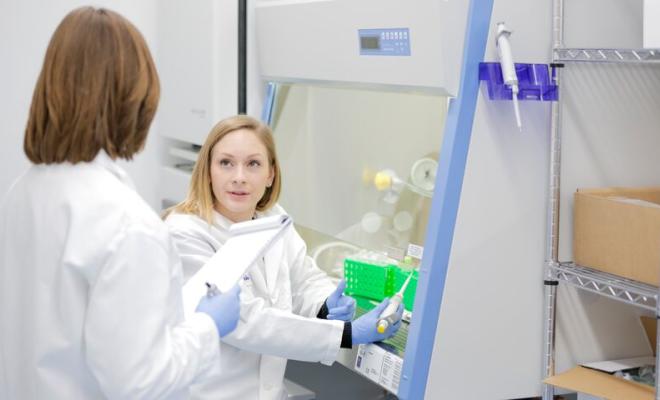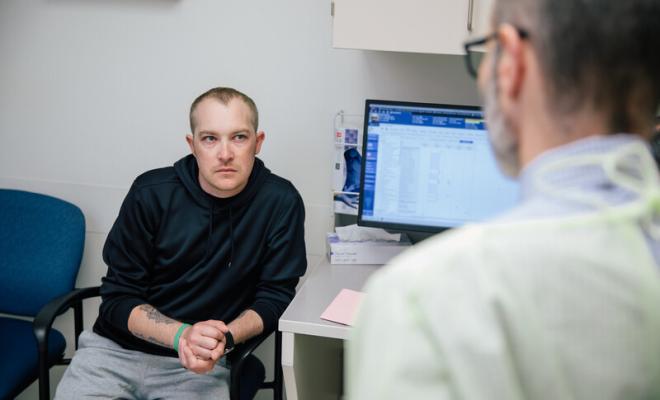Know What to Expect
As you live longer with cystic fibrosis, you can partner with your CF care team and other health care professionals to learn about treatment options — well before you need them.
Your body may need to be treated for advanced CF lung disease when:
- Your FEV1 less than 40% predicted when stable
- Your CF care team is referring you to be evaluated for a lung transplant as a treatment option
- You were previously admitted to an intensive care unit (ICU) for respiratory failure
- You experience hypercarbia (high levels of carbon dioxide in your blood)
- You require oxygen therapy at rest during the day
- You experience pulmonary hypertension (high blood pressure in the arteries between your lungs and your heart)
- You experience severe discomfort with any physical activity due to trouble breathing (New York Heart Association Class IV)
- You walk less than 400 meters (1,312 feet) during a six-minute walk test (6mWT)
Getting the right care with advanced disease means planning ahead. Called advance care planning, it allows you to think about what matters to you and learn about your treatment options. You should use advance planning with your CF care team and other health care professionals when and if you need it.
“But populations are made up of individuals, illustrated by a video featuring Becky Skinner, an adult with CF. Becky’s story is similar to the stories of many people with CF — including mine. Our current health leaves us focused on the present and the care we need now. I benefit from CFTR modulators — first Orkambi and now Trikafta — and my husband, Justin, and I are grateful that they have stabilized my health to delay transplant. But, like Becky, my health hasn’t been transformed by these modulators.” — Meagan Tenyer, adult with CF, from the CF Community Blog.
These discussions can be ongoing and provide an opportunity to include trusted caregivers (family members, close friends) to support you, take notes, and help you process the information afterwards.
Talk to your care team about:
- What the likely course of your condition is, the treatment options, and potential side effects (your prognosis)
- What you want to accomplish as goals in your care (what matters to you)
- What your preferences are if you are unable to make those decisions and how to document them, so others are aware of your wishes (an advance directive)
Options to treat and monitor aspects of advanced CF lung disease may include:
- Lung transplantation for which your care team would work with a transplant team to coordinate a referral so you can learn more about the process
- Pulmonary rehabilitation where you work with a trainer to do exercises that improve your ability to breathe
- Symptom and pain management where your CF care team may work with palliative care specialists to improve your quality of life
- Screenings to routinely monitor your physical and mental health so that additional treatment and therapies can be provided if you need it
- Assessment of any concerns you may have about your finances and the level of social support
- Consultations with specialists, including doctors who specialize in high-risk pregnancies for those considering starting a family
“My physical therapist challenged me, and when I experienced what oxygen was able to help me accomplish, I immediately began to see it as a tool for my benefit as opposed to something that should define my limitations. A switch was flipped in my mind and that sudden realization — that increasing my oxygen usage could help discover my true physical potential — was a euphoric sensation.” — Brian Armstrong, adult with CF, from the CF Community Blog
Take Advantage of Resources
Balancing life with a chronic condition requires resources. Knowing what resources are available and how to take advantage of them can make that balancing act easier — for you and your family caregivers.
- Get help from Compass in understanding insurance basics, troubleshooting insurance coverage issues, seeking financial assistance for medical care and other living expenses, and finding answers to legal questions related to work, school, and disability/government benefits. Highly trained case managers are there to provide personalized, one-on-one service to help people with CF and their families in dealing with challenges related to life with CF.
- Get motivated and trained to maintain your physical and emotional well-being through programs to build strength and improve posture with fewer symptoms if you are on supplemental oxygen or experience breathlessness. Beam provides online classes that are both live and on-demand with instructors living with or working with people with CF. This is a monthly, subscription-based service that comes with a fee.
"The Advanced Disease program helped me focus on areas I struggle with such as stiffness through the spine, ribcage, and posture. With established lung disease I experience breathlessness with exertion and this program has taught me how to pace myself and catch my breath. Beam has really helped me feel stronger and more confident with exercise." — Somer Love, adult with CF
Belong to Community
As people with CF live longer, the individual experience can feel isolating when others with the same disease can look so different based on their mutation, how they maintain or respond to treatments, and their personal circumstance.
But as diverse as CF is, you are part of that diversity and you can belong to a community that is there for you when you need it, however you want to connect.
- If you want to connect with someone who is living with advanced disease or is going through a life transition that you’re experiencing or want to learn more about, you can find them through CF Peer Connect. As a one-to-one peer support program for people with CF and their family members ages 16 and older, CF Peer Connect can match you with someone based on aspects of living with CF so you don’t have to feel alone.
- You know best what living with CF is like, so if you want to share your experience to impact research, care, and programs to help people living with advanced CF disease, you have the opportunity to do so through Community Voice. Choose how much you want to be involved and the topics you care about through surveys, focus groups, and committees.
- If you have family and friends who want to connect locally with others who care for people with CF, a great place to start is with CF Foundation Cares. These are casual gatherings intended to for conversation, building relationships, and encouraging families, friends, and caregivers, no matter where their loved one with CF is in their journey. Learn more about an event through your local CF Foundation chapter.
- If you want to connect with others going through similar experiences, attend a community conference, such as:
- CF Circles, small group discussions that allow you to feel heard and share your experiences with others
- BreatheCon, a unique event to virtually gather with other adults with cystic fibrosis in a welcoming, inclusive space where you can be your authentic self
- ResearchCon, virtual gatherings for everyone with a personal or professional connection to cystic fibrosis to learn and discuss CF-related science and care alongside others living with and studying the disease



